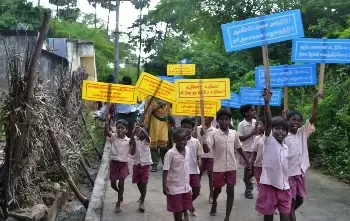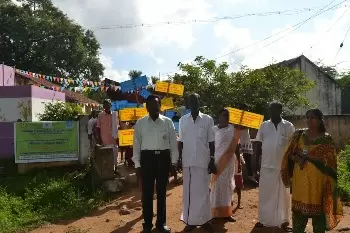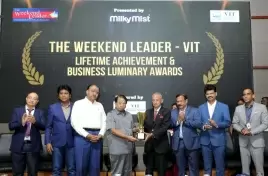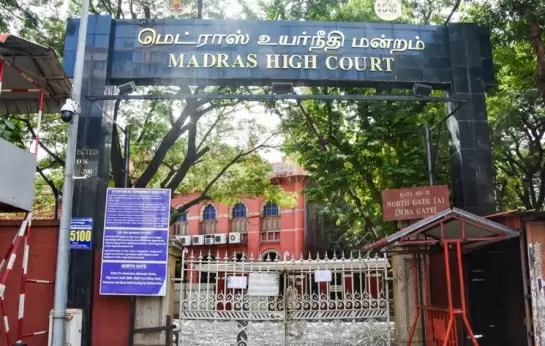The changing face of a tribal village near Chennai

01-December-2012
Vol 3 | Issue 48
There is a certain air of sophistication in the way young Lakshmi carries herself. She uses the word "Ma’am" rather than Madam when addressing city women at sight.
She carries herself with a quite confidence that stands out among the other women and men of the village in the thatched background that is her home. She is the first girl from the tribal settlement of Irulars in Thirupper village, about 60 km from Chennai, to have studied up to class ten.
 |
|
Children of Thirupper with placards demanding toilets in their homes
|
The Irulars once made a living by catching snakes. But that situation has changed now, and today they are mostly farm workers, and beneficiaries of the central government’s National Rural Employment Guarantee Act that provides them job for hundred days in a year.
The more encouraging news is that women from the community are having higher aspirations. They want to learn new skills, find better jobs, earn, and look after their families like their urban counterparts.
Lakshmi, like many other women of her village, wants to learn tailoring.
"We go for hard work at the fields. We want jobs in the village itself. Only then can we manage our house as well as earn. Our hard work in the fields leaves us with no time to do housework," complains 40-year-old Kamatchi with Lakshmi nodding in agreement.
That women like Lakshmi and Kamatchi have begun to aspire for a better life itself is something that the Rotary Club of Thiruvanmyur, which has been working in the village for the last three years, can be proud of.
“The purpose of our service in this village is to change the lives of people here. We are training about 18 women in tailoring now. After their training, we’ll find them jobs in a garment factory,” says U Karunanithi, president of the club.
The club has built a water tank for the residents, who were earlier struggling to get water supply from the government.
The Rotarians had first taught the villagers to read and write. "It took us one full year to achieve this," says Karunanithi, whose club had adopted the village even before the District Rotary (3230) launched the ‘Happy Village’ project earlier this year.
A biannual medical camp and the supply of uniforms and notebooks to students are some of the other activities of the club in the village. The children were also taken on a sightseeing tour to Chennai recently.
The Irular families have been supplied Mango, Coconut, Guava and Lime saplings to supplement their future income.
The Club also provided the local government school with 18 sets of tables and chairs. It has drawn up plans to build concrete homes to replace the thatched ones with assistance from the District Rotary.
"Our aim is to make the village self-sufficient. It surely is an ongoing process but we hope to concentrate more on the Irular settlement which is most economically backward in the village," says Karunanithi.
The focus now is on building them toilets. The promise of toilets also extends to the rest of the village. In the village of 170 families, which includes the 35 Irular familiess, only five homes have toilets!
Awareness is being created on use of toilets. "The idea of building self-decomposing septic tanks to dispose of human waste is a very valuable education even to me. I am now a convert to the concept of building toilets at home," says M Paari, husband of Chinnaponnu, the elected Panchayat chief of the village.
At a recent awareness camp, the sanitation educator brought by the club explained to the villagers that open defecation does not turn the stool automatically into manure as they tended to believe and it takes over 30 days for it to go dry during which period it remains as sediment of harmful bacteria and worms.
The statement made a few in the audience look dazed as the educator thrashed their claims of lack of funds to build toilets at home.
 |
|
Rotarian Karunanithi has mobilized the support of local leaders, who are seen with him at a recent medical camp in the village
|
"Ideally, a government can campaign widely, but it gets lost in the large maze that is the government machinery. Whereas when we or any NGO campaigns, it is focused and more effective," says Karunanithi, who adds that they began working only in the colony and the natural corollary beneficiary has now become the main village.
"It is interactions with these people (Rotarians) that often explains to us some of the government schemes," said J Tulasi, E Pazhani and G Jothy also office bearers of the Panchayat.
"My three years of work in the village has taught me one thing. That education and employment should be twin goals in uplifting people. One without the other will be a handicap in moving forward towards the goal of self sufficiency," says Karunanithi.
Their project in the village is not a short term one but would go on, be it five or even ten years, says Karunanithi, and it will not be hampered whether he’s heading the club or not, he assures.














